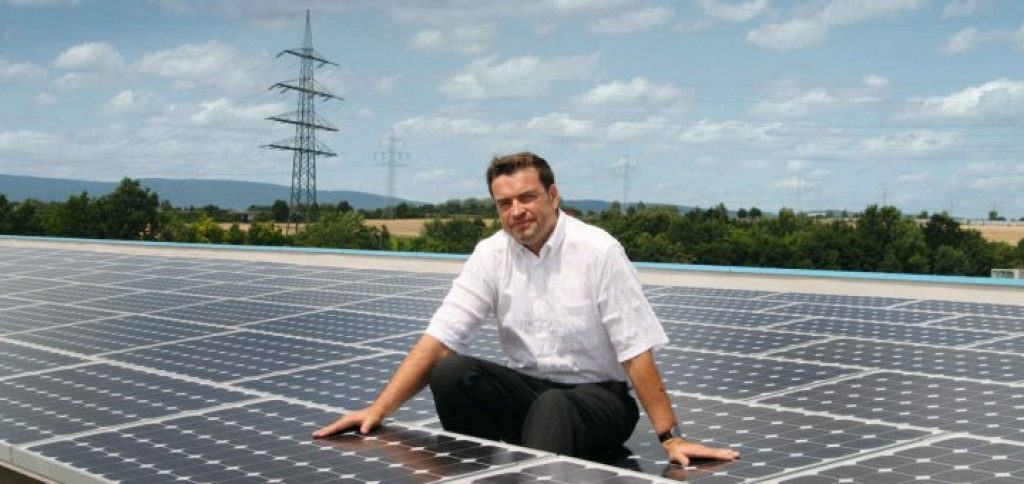Themed Week Energy Efficiency: Non-alcoholic beverages: Consumers want sustainability

Sustainability – a key term that is essential when we speak to our customers. It is also something that a large number of consumers now take into account when purchasing goods. Now is the time for the non-alcoholic beverage industry to see sustainability as a major success factor.
Water is more than just a drink. In fact, more and more consumers associate water with many other things, according to Matthias Horx, a visual trends researcher. During a mineral water symposium, the mineral-water companies Gerolsteiner and Hassia Mineralquellen got together with the magazine Wirtschaftswoche Green Economy and reached the following conclusion: “For consumers, water is by no means just another drink devoid of anything special. Consumers embark on an exciting journey through Earth with every sip. Before a single drop hits the tongue, it has to seep through the numerous layers of rock that were left behind after the Ice Age and the Cretaceous period. And that whole process takes hundreds of years.” This quote illustrates how emotionally charged the topic of mineral water is and how well the focus on sustainability and the product itself have come together as one. Dirk Hinkel, Managing Partner of the Hassia Group, agrees with this idea and adds that, “sustainability is the new premium.” Ullrich Schweitzer, the Hassia Group’s Managing Director of Marketing, provides his own insights: “We have to explain the added value to the consumer. Our scope covers sustainability and quality.” This was followed up by Ulrich Rust, Managing Director of Gerolsteiner Brunnen: “Water equates to taste, health and general well-being.”
Hassia Group focuses on sustainability
The Hassia Group’s top goal: a climate-neutral offering. This is not just a goal for the Hassia mineral springs in Bad Vilbel. It is also an aspiration of the group’s subsidiaries: Lichtenauer Mineralquellen, Thuringian Forestquell, Glashäger Brunnen, Wilhelmsthaler Mineralbrunnen and the group’s fruit juice companies – Rapp’s Kelterei, Kumpf and Höhl. But it is all about going one step at a time. The Bad Vilbel site has been carefully designed to become climate-neutral through various measures, such as the implementation of e-stackers, the use of green electricity and the continuous planting of trees to help neutralize the company’s carbon footprint.
Gerolsteiner – for the consumer the most sustainable non-alcoholic beverage producer
In terms of sustainability, Gerolsteiner Brunnen is currently number one among non-alcoholic beverage suppliers. A nationwide online survey was fielded by Deutschland Test and Focus-Money and carried out in cooperation with the analysis and consulting firm ServiceValue. The key question they posed was: “Which brand stands for sustainability?” Gerolsteiner came out on top. In fact, it is clear that the company is particularly on track to become sustainable. In 2014, for example, Gerolsteiner was the first mineral-water company in Germany to publish a sustainability report. The brand also supports many creative and sustainable projects in the region.
Policy of small stepfs at Ensinger Mineral-Heilquellen and beckers beste
Many other non-alcoholic beverage companies are also becoming more and more concerned about sustainability and are often taking small steps forward with regard to their environmental policies. For example, Ensinger Mineral-Heilquellen recently invested in a new energy management solution. There are now 85 measuring points that monitor the majority of the machines and systems that are on the production line. In addition, the company is switching out its gas-powered forklift trucks for new electric-powered ones. The latest landmark decision from the fruit-juice specialist beckers bester: installing professional LED lighting. This new move supplements existing measures, such as generating steam through a biomass heating plant, using green electricity and compensating for any CO2 emissions by supporting two ecological projects: the “Eurus Wind Farm” in Mexico and the “DakRTih Hydropower Project” in Vietnam. This means beckers beste is not only combating CO2 levels on a national level, but also helping reduce these levels internationally.
Exploring unchartered territory
Thinking outside of the box is often enriching. In this case, you don’t have to go far beyond the realms of the non-alcoholic beverage industry: Brauriese AB InBev wants to set very clear guidelines for the future. By 2025, the company plans to satisfy 100 percent of its electricity needs from renewable sources. It is a big task for the world’s largest brewery group, because the current percentage is below 10 percent. “The move away from fossil fuels saves both the environment and our resources. We are committed to making tangible changes. As a global company, we have a unique opportunity to play a leading role in the campaign against climate change by using sustainable energy,” said Carlos Brito, the CEO of AB InBev. To get a better picture of what Carlos Brito is talking about, consider this concrete comparison: Such changes would equate to taking 500,000 cars off the road.
Innovative and sustainable solutions on the supplier side
Everyone is aware that suppliers are supporting sustainability initiatives within the non-alcohol beverage industry by implementing an increasing number of innovative, sustainable solutions. The drinktec exhibitor Sidel, for example, developed the “right weight bottle” – a plastic bottle that weighs less thanks to its design. Its manufacturing process also consumes less energy. With its stretch-blown machines, KHS offers up the Airback Plus system, which requires about 40 percent less compressed air. You can find out more about this innovation at drinktec. Krones AG, which has taken up nearly an entire exhibition hall at drinktec 2017, is launching light-weight elements for cleaning machines. These new items weigh up to 30 percent less and can save up to five percent of heating costs. Similar concepts are cropping up everywhere all the time and with greater frequency. This is also because the alcohol-free beverage sector is, in many ways, designed to provide consumers with sustainable solutions.
During drinktec, you will see that energy and resource efficiency is of great importance to everyone across all of the exhibition areas : The water-technology@drinktec Symposium, which is organized by the VDMA’s Food Processing and Packaging Machinery Association, is focused on water management. At the PETnology Europe symposium, new PET innovations, such as PEF, will be on display. Visitors at drinktec will also discover more mindful ways of handling and managing energy and resources, as well as learn about sustainable beverage production. To find out more about what’s going on, please consult the drinktec supporting program. And, with the new drinktec Solutions Guide and Innovation Guide services, visitors can quickly and easily find their desired products and solutions.
